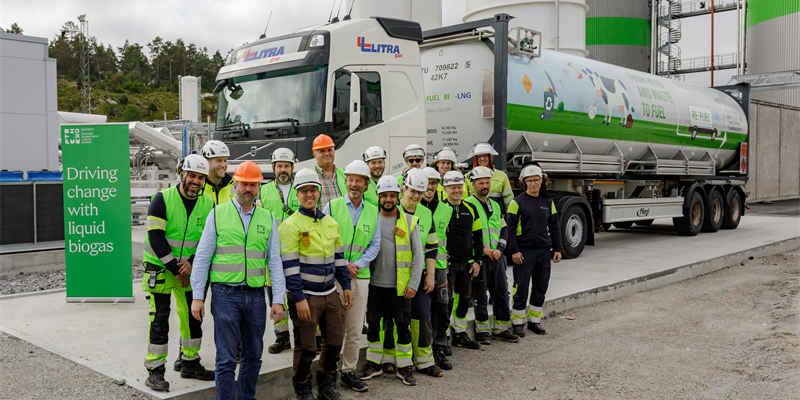Biokraft passed a major milestone when the newly built liquefaction plant, connected to the company’s biogas plant in Södertörn, delivered its first batch of bio-LNG. The shipment consisted of 34 tons of bio-LNG to be used by trucks in northern Europe. A filled container holds 17 tons of bio-LNG which is enough for fossil-free driving with a fully loaded long-haul truck for approximately 50,000 kilometers.
Biokraft’s biogas is 100% fossil-free and produced by digesting collected food scraps and slaughterhouse waste from municipalities in Greater Stockholm. The newly built liquefaction plant is located directly adjacent to the digesters in Södertörn and converts biomethane into liquid through cooling. The unit has a production capacity of 220 GWh per year and is thus the world’s largest (with a production capacity of 50 tons of bio-LNG per day). The company’s potential market is significantly broadened towards heavy road transport, shipping and industry thanks to liquefaction. Bio-LNG has a high energy content per unit volume and can be transported long distances at a reasonable cost to meet a strong demand in Northern Europe.
“The launch of Stockholm bio-LNG is a major strategic milestone and strengthens our market position as one of the leading bio-LNG producers in the Northern European market. The project also shows that, in line with our strategic growth plan, we have the competence and capacity to build and operate large-scale biogas plants,” commented Matti Vikkula, CEO of Biokraft.
The Stockholm bio-LNG project started two years ago. The investment is approximately SEK 330 million and has been financed with equity, bond loans and government investment support from Klimatklivet.
“It has been exciting to lead this project, which, despite challenges, was completed reasonably according to plan. I am incredibly proud of the engineering created by the entire team and in collaboration with our suppliers and partners,” noted Jean Collin, Senior Project Director at Biokraft.
The Stockholm bio-LNG project will be in the commissioning phase for some months while production is scaled, and functions and delivery parameters are tested. The facility is expected to be transferred to regular production towards the end of the year.
Source: Biokraft







